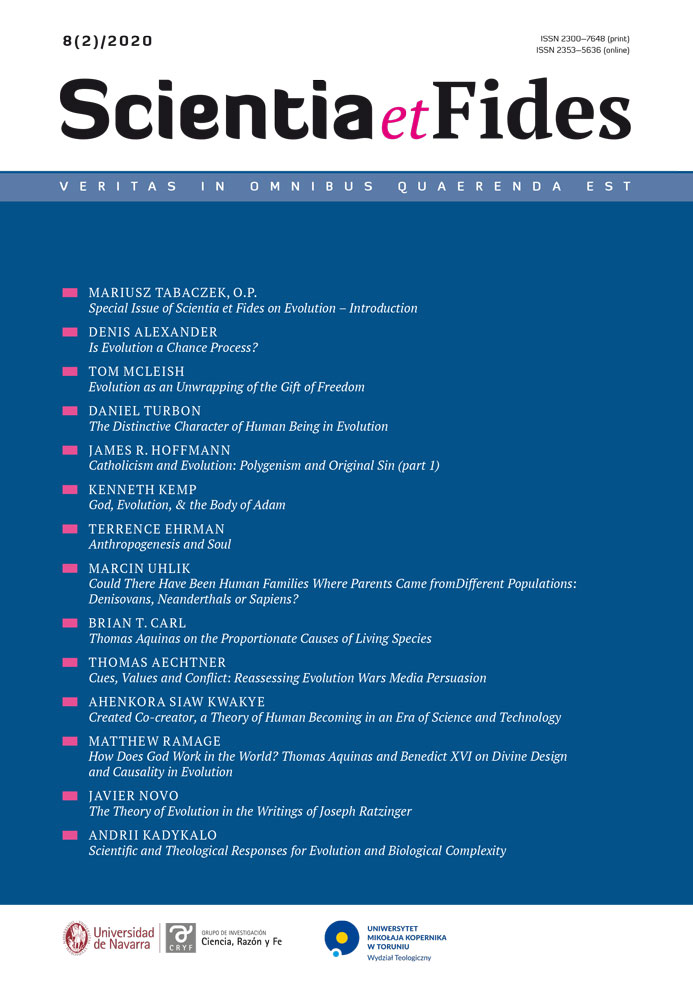Is Intelligent Design the Answer to Darwinism? Marcos Eberlin’s Foresight and the Limits of Irreducible Complexity as Scientific Paradigm
DOI:
https://doi.org/10.12775/SetF.2020.027Keywords
Intelligent Design, foresight, biochemistry, irreducible complexity, Aristotle, AquinasAbstract
Marcos Eberlin is a chemist and mass spectrometer who advances in a new book a refined Intelligent Design (ID) theory hinging on “foresight,” or the apparent teleology and purpose discernible in biological, chemical, and other complex life systems. Repurposing older ID arguments, such as those of “irreducible complexity,” and introducing new examples of phenomena pointed to by other ID theorists, Eberlin makes a strong argument for mindful creation by a “superintellect”. But is ID sufficient to answer Darwinism? Does “foresight” go far enough in providing an alternative view of the origin of complex lifeforms? I argue that Eberlin, and other ID theorists, does not have a robust-enough definition of science to counter non-theistic theories of biology and biochemistry. An Aristotelian-Thomistic understanding of science allows us to go beyond the divide between ID and a-theistic theories and move the science-and-faith debate onto more solid ground.
References
Barrow, John D. 2009. The Book of Nothing: Vacuums, Voids, and the Latest Ideas about the Origins of the Universe. New York, NY: Vintage.
Behe, Michael J. 1996. Darwin’s Black Box: The Biochemical Challenge to Evolution. New York, NY: The Free Press.
Collins, Francis. The Language of God: A Scientist Presents Evidence for Belief. New York, NY: Free Press, 2006.
Davies, Paul. 1993. The Mind of God: The Scientific Basis for a Rational World. New York, NY: Simon and Schuster.
Dembski, William, ed. 2014. Uncommon Dissent: Intellectuals Who Find Darwinism Unconvincing. Wilmington, DE: ISI Books.
Denton, Michael. 2016. Evolution: Still a Theory in Crisis. Seattle, WA: Discovery Institute Press.
Eberlin, Marcos. 2019. Foresight: How the Chemistry of Life Reveals Planning and Purpose. Seattle, WA: Discovery Institute Press.
Ellison, Aaron M. and Nicholas J. Gotelli. 2009. “Energetics and the Evolution of Carnivorous Plants—Darwin’s ‘Most Wonderful Plants in the World’.” Journal of Experimental Botany 60, no. 1.
Falk, Darrel R. Coming to Peace with Science: Bridging the Worlds between Faith and Biology. Downers Grove, IL: InterVarsity Press, 2004.
Feser, Edward. 2019. Aristotle’s Revenge: The Metaphysical Foundations of Physical and Biological Science. Neunkirchen-Seelscheid, Germany: editiones scholasticae.
Grossman, Lisa. 2011. “In the Blink of a Bird’s Eye, A Model for Quantum Navigation.” Wired, January 27.
Hawking, Stephen. 2011. A Brief History of Time. New York, NY: Bantam.
Hoyle, Fred. 1981. “The Universe: Past and Present Reflections.” Engineering and Science 45, no. 2.
Maurer, Armand A., ed., Étienne Gilson. 2008. Three Quests in Philosophy. Toronto: Pontifical Institute of Mediaeval Studies.
Meyer, Stephen C. 2021. (forthcoming) The Return of the God Hypothesis: Compelling Scientific Evidence for the Existence of God. New York, NY: HarperOne.
Nabel, Gary J. 2009. “The Coordinates of Truth.” Science 326, no. 5949.
O’Rourke, Fran. 2010. Pseudo-Dionysius and the Metaphysics of Aquinas. Notre Dame, Ind.: University of Notre Dame Press, reprint of first paperback edition.
Redpath, Peter A., ed., Charles Bonaventure Crowley. 1996. Aristotelian-Thomistic Philosophy of Measure and the International System of Units (SI): Correlation of International System of Units with the Philosophy of Aristotle and St. Thomas. Lanham, MD: University Press of America.
Spitzer, Robert J. 2010. New Proofs for the Existence of God: Contributions of Contemporary Physics and Philosophy. Grand Rapids, MI: William B. Eerdmans.
Thomson, J.J. 1909. “Inaugural Address.” The British Association of Winnipeg. Nature 81, August 26.
Wallace, Paul. Love and Quasars: An Astrophysicist Reconciles Faith and Science. Minneapolis, MN: Fortress Press, 2019.
Weatherall, James Owen. 2016. Void: The Strange Physics of Nothing. New Haven, CT: Yale University Press.
Downloads
Published
How to Cite
Issue
Section
License
Copyright (c) 2020 Scientia et Fides

This work is licensed under a Creative Commons Attribution-NoDerivatives 4.0 International License.
CC BY ND 4.0. The Creator/Contributor is the Licensor, who grants the Licensee a non-exclusive license to use the Work on the fields indicated in the License Agreement.
- The Licensor grants the Licensee a non-exclusive license to use the Work/related rights item specified in § 1 within the following fields: a) recording of Work/related rights item; b) reproduction (multiplication) of Work/related rights item in print and digital technology (e-book, audiobook); c) placing the copies of the multiplied Work/related rights item on the market; d) entering the Work/related rights item to computer memory; e) distribution of the work in electronic version in the open access form on the basis of Creative Commons license (CC BY-ND 3.0) via the digital platform of the Nicolaus Copernicus University Press and file repository of the Nicolaus Copernicus University.
- Usage of the recorded Work by the Licensee within the above fields is not restricted by time, numbers or territory.
- The Licensor grants the license for the Work/related rights item to the Licensee free of charge and for an unspecified period of time.
FULL TEXT License Agreement
Stats
Number of views and downloads: 1119
Number of citations: 0



